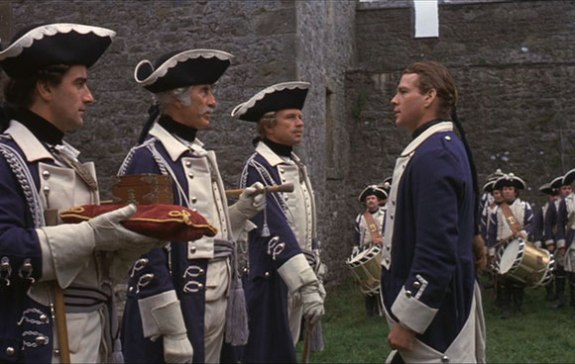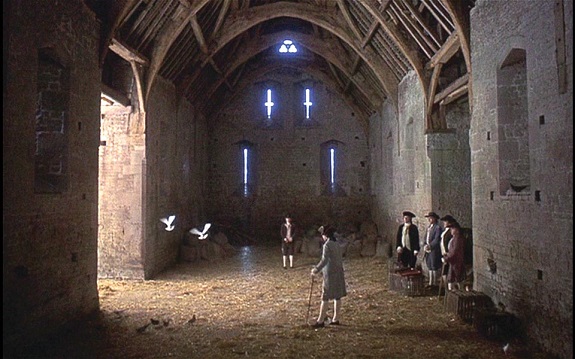This post is part of the 3rd Annual British Invaders Blogathon, hosted by Terry at Shroud of Thoughts. Read the rest of the jolly good posts in this event HERE!
(SPOILERS)
After wowing film lovers and critics with revolutionary films such as 2001: A Space Odyssey and A Clockwork Orange, many received Stanley Kubrick’s Barry Lyndon with a collective yawn. (Due to technical awards, however, it became Kubrick’s most awarded film since Spartacus.) In a decade full of seminal films, it acquired a reputation as pretty to look at, but not remarkable otherwise.

And it is pretty. Indeed, one could almost call it cinematography porn. John Alcott’s photography is a treat for the senses, even more so because Kubrick insisted on shooting every scene in natural light, including indoor scenes. Subsequently, it became a long and arduous shoot, which helped to sink its reputation even more.
Over the years, though, many critics have reevaluated the film within Kubrick’s oeuvre and it has steadily risen in estimation. Now it is considered by most a masterpiece.
Though I’m sure there are earlier contenders, it’s quite possible that William Makepeace Thackeray’s novel The Luck of Barry Lyndon (later reissued under the title of The Memoirs of Barry Lyndon, Esq.) features the very first anti-hero in literature. His later novel, Vanity Fair, featuring his scheming protagonist Becky Sharp, bears the subtitle “A Novel Without a Hero.” So he may have been the inventor of the anti-hero AND the anti-heroine.
That Kubrick chose to make his adaptation during a period that saw many anti-heroes in film would seem a matter of perfect timing. Perhaps critics were not used to this kind of protagonist in historical films, or mistakenly dismissed it in their minds as “just another costume drama,” which were on the wane at the time.

The film has been accused of being boring, a strange charge since it is chock-full of incidents. The story of an 18th century down-and-out member of the Irish gentry (Ryan O’Neal) who flees Ireland after a duel over a woman, he is robbed, forced to join the army, deserts the army, is captured, forced into conscription with another army, deserts again, becomes a gambler and con man, courts a woman (Marisa Berenson) with a huge fortune whose husband is still living, marries her when the husband croaks…
Excuse me, I need to take a breath.
…fathers a son whom he adores, chases all the housemaids, humiliates his wife, throws most of her fortune away on an attempt to gain a peerage, gains the enmity of his stepson (Leon Vitali), beats up his stepson in front of other members of the aristocracy, is shunned by his erstwhile aristocratic friends, loses his only child in an accident, his wife tries to kill herself, her son come back and challenges him to a duel, the duel ends with him losing his leg, his stepson forces him to leave his wife and he ends up a destitute wanderer.
PHEW!

Yes, the film features Kubrick’s signature deliberate pacing. I like to describe it as a moving painting, and many shots are composed like paintings of the era. But I think it’s far from boring and always find myself utterly engrossed in both the story and Kubrick’s use of the camera.
Barry is a scoundrel and a rotter who wrecks every chance he has at happiness and success in life. He is an outsider always trying to become an insider. Unlike many modern examples of anti-heroes, he never really becomes sympathetic enough to win the audience over to his side. Instead, Kubrick distances us, both with the camera and the way he tells the story, and allows us to come to our own conclusions about him. He is despicable in many ways, but are the aristocrats he so desperately wants join really that much better? Do they snub him because he is cruel to his wife and stepson, or because he isn’t one of them?

In the novel, Barry himself is the (unreliable) narrator; Kubrick (who also wrote the screenplay) replaces him with an omniscient (and also unreliable) narrator (Michael Horden). I don’t feel guilty about revealing so much of the plot here, because the narrator telegraphs almost every major plot twist to the audience. Yet because of the pace of the storytelling, there’s still a dramatic punch to each event. He uses this particularly well in the final duel, which is an agonizingly suspenseful and masterfully shot sequence.

The film is not just visually stunning, but also aurally. The dialogue is kept to a minimum, but Kubrick, who adored classical music, used it to convey mood and time and place. In the Irish scenes, the tune Women of Ireland by Sean O Riada, arranged by Paddy Maloney of the group The Chieftans, enhances the beauty of the Irish locations and conveys Barry’s youthful romanticism. Of the classical pieces used in the film, the one most associated with it is Handel’s Sarabande, which is used at various points in different arrangements.
Kubrick was a great director for many reasons. One was because there were few genres he could not master—noir, epic, political satire, black comedy, sci-fi, dystopian, war, among others. It’s no wonder his foray into historical fiction would turn out to be the antithesis of “just another costume drama.” I’m glad critics have finally caught up.


Great article! I have to go back and rewatch this one. Never read the book and now I really want to. I remember back in the day (80s) everyone said this was a snoozer, but a few of us loved it. Vindicated!
Thank you! I haven’t read the book yet, either. I like reading books movie I love are based on. I think I’ll put it in my Audible wish list…
Even in 1975 Barry Lyndon did have its champions. For example, Vincent Canby gave it a good review in The New York Times and Roger Ebert gave it a very positive review in The Chicago Sun-Times. It was also nominated for several Oscars and BAFTA Awards. That having been said, I do think at the time it suffered in comparison to some of Kubrick’s earlier work (Dr. Strangelove, 2001, and A Clockwork Orange). Its reputation certainly has improved in the decades since! Thank you so much for this fine blog post and for participating in the British Invaders Blogathon!
I know there were a few who liked it at the time, but I remember (aging myself here) reading reviews by notable critics, and they just didn’t GET it. Like, how could Kubrick make A Clockwork Orange and then make this?
Thanks for hosting!
I still recall seeing this in a theater during a Kubrick revival and while getting bit dozy, it felt as if I’d seen it before and could predict what would happen next. That turned out to be Kubrick’s “fault” as the narration and Lyndon being established as a non-lovable loser pretty much spelled things out to my brain as the film played out. I wasn’t sure if I liked the film other than the art direction and cinematography, but t haunted me for a bit.
I watched it again recently and it’s certainly aged extremely well as a fantastic period piece and O’Neal’s best role (in my opinion). You can’t tell when it was made, which is a great thing, as many costume dramas date themselves into lovable corniness or camp.
I agree about O’Neal. I’ve felt for a long time that he’s underrated as an actor.
I think he’s another case of a star with raw talent who had private/public issues that kept kicking his career in the tender bits (Ouch!). And… hey! You’ve recently lost your glasses and/or are wearing contacts! I just now noticed that (oops!) 😀
Yep, I’m using contacts now. Plus that other picture was about 7 years old. Time to update! 🙂
Hah! And I’ll bet a penny you also bought a straaaaange painting at a flea market for dirt cheap that you keep in a locked room, Glori-anne Gray!